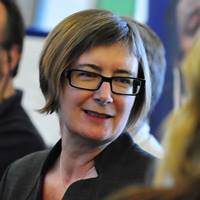Philosophy of Sex Poster Display
April 23, 2018
by Lewis Brennen
This Wednesday, 25 April, from 12-1pm, there will be an exciting poster display session in the South Corridor of Avenue Campus, celebrating the fantastic work of students on Dr Fiona Woollard’s ‘Philosophy of Sex’ module. This is part of their assessment for the module, which requires them to critically assess key arguments and ideas in an original and eye catching manner. Every year the students display great creativity and wit and this year looks to be no exception!
Please do drop by during the poster display session. The students will be waiting by their posters to explain their ideas to you. There will also be cake available.
The posters will be on display in the South Corridor until Monday 30 April, so if you cannot make the poster session then do go have a look later this week.
Southampton Stonewall Lecture 2018
April 16, 2018
by Lewis Brennen
On the evening of Thursday 15 February, Professor Alison Oram (Leeds Beckett University) visited Avenue Campus to deliver the annual Stonewall Lecture. This was the seventh Southampton Stonewall Lecture, organised by Professor Mark Cornwall, an annual event dedicated to exploring the rich heritage that is lesbian, gay, bisexual, transgender and queer (LGBTQ) history, in order to educate the present about the past and to promote social justice and inclusivity. 
Alison’s talk was titled ‘Queer Beyond London: Culture and Place in English Cities, 1970s-1990s’ and drew on research from her and Matt Cook’s current AHRC funded research project, ‘Queer Beyond London’. The project explores LGBTQ life in four provincial cities (Manchester, Brighton, Leeds and Plymouth) to challenge the usual London-centric history of queer life. The lecture last Thursday focused on three of those cities—Brighton, Leeds, and Plymouth—exploring why queer people moved to and from those cities, how they made their homes there, how this reflected the queer culture and communities more widely in those places, and how distinct trajectories of queer life and history developed. Alison’s approach here thus drew on a number of approaches, from oral history, to sociology, and urban geography. In doing so, it complimented the 2013 Stonewall Lecture given by George Chauncey on ‘Gay New York’.
Alison revealed the importance of communal living and collective households for queer residents of 1990s Brighton and the potential political radicalism that living in small flats and bedsits could encourage, but also some gender divisions within the queer community and a darker underside of Brighton with homophobia and a dangerous drugs scene. We saw that queer Leeds was a thriving centre of lesbian feminism, but with racial divisions that meant it was not always comfortable for queer people of colour. Moving onto Plymouth, Alison showed how queer culture there reflected the city’s close ties to the military, which encouraged a culture of relative toleration in the city as early as the 1960s. That said, it appears that while many queer residents of Plymouth were not exactly in the closet, they were not quite out and proud either; audience discussion during the following drinks reception reflected on how Plymouth reminded them of 1990s American ‘Don’t Ask Don’t Tell’ culture.
This was a fascinating lecture and it now seems inevitable that Alison’s work on the ‘Queer Beyond London’ project will serve as a much-welcomed corrective to London-centric modern queer history. Thank you very much to everyone involved in organising the lecture and, of course, to Alison for joining us in Southampton for this fascinating talk.
